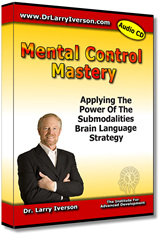Handle It – Dealing with Criticism and Negative Feedback (Part 2)
Order and download this entire nine-part audio program.
(…continued from last week)
Commitment To The Process
You need to make two commitments to yourself.
First, you must listen and learn. You must listen internally and pay close attention to your own internal dialogue, and your sense of right or truth. You also need to listen externally to the voice of your criticizer, or this person who’s on the other side of the table from you.
Secondly, you need to change and manage the way you act or react. It’s essential to explore options without bias, to separate problems from people, to explore the reasons for the resistance and the defensiveness, and to act with honor, commitment and deep communication.
So we must listen and learn. And secondly, we must manage how we act and/or react in the situation. One of the things that can make a gigantic difference for most of us in managing these criticisms or negative feedback we receive is by having higher levels of emotional intelligence.
Your Brains Centers
Emotional intelligence is a thinking process. You have three parts to your brain. You have the brain stem, which is what’s called the reptilian brain. It is a very ancient part of us. It was the first part of the brain developed and it basically helps to run your physiology. It keeps your heart beating when it’s supposed to, keeps hormones balanced, assists movements, and generally promotes the overall functioning of your physiology.
The second brain is the Limbic Cortex, which is called the caveman brain. It is your fight or flight center. It holds the reticular activating system, the amygdala, many different parts that help you respond to emergencies, crises and so on. It can save your life in rapid response need.
Then there is the third brain, your Neo Cortex, which is your thinking, two hemispheres of the brain. This is the most recently developed in Homo Sapiens.
For better or worse, human communications are not just shaped by rational judgements but also by our emotional experience. Quite often we react from this deep emotional center. It’s human nature. It’s part of who were are. We are all emotional people. We need to use emotional intelligence to help us balance some of the negativity that comes from criticism or from criticizing.
Your EQ Center
There are five components to emotional intelligence. The first is, knowing one’s own emotions. We need to have self-awareness. We have to recognize the feelings going on inside of us as they are happening. This is the cornerstone. All too often people are not paying attention. They just react. They don’t even notice where it came from or what happened, but their emotions erupt. If you know me and you’ve been in my programs, you know I talk about the only four ways emotions are created.
The four ways are chemical or hormonal change in the body, damage to the brain itself, your internal dialogue, or something happening to your physiology. Most of the time, the reason we feel what we feel is because of our thinking processes and our self talk.
So we need to catch that self talk, we have to catch that emotional pattern. And we have to catch it as it’s going on. Not later, not explode and then go “Hmm, I wonder why I did that.” But catch it right at the onset.
The second part of emotional intelligence is managing our emotions when they occur. Handling feelings so they are appropriate is an ability that is central to a healthy, mental and personal life. You need to manage what’s going on within you. Not only do you have to notice the emotions, but you have to be able to manage them. Most of the time, this means handling your self-talk.
The third component to emotional intelligence is motivating oneself as needed. Getting yourself going when needed in the achievement of worthwhile goals is essential for motivation, mastery, creativity, focus, and a healthy overall life.
There are times when all of us procrastinate, that comes with the territory, yet we need to be able to motivate ourselves most of the time when we need to get moving. Not just let our emotions run on whim but get moving when we need to get moving.
So in order to do that, we first need to know what is going on within ourselves emotionally. Second we need to manage those emotions so that third we can motivate ourselves as needed.
These first three components for emotional intelligence have to do with us. The next two have to do with the people around us.
The fourth aspect of emotional intelligence is recognizing emotions in others. Empathy means looking at the situation from the other person’s perspective and being attuned to the subtle social and communication signals being given. We need to see what is going on with people. If we can’t even do it within ourselves how effective we will be in doing that with others? So we must begin to emotionally manage ourselves so that we can better recognize what is happening with the people around us.
Then fifth, we can more effectively manage those relationships. Skills in managing relationships and communication are central to credibility, to leadership, to team achievement, to interpersonal effectiveness and to overall success and happiness. We need to be able to deal with the people around us. It’s crucial to who we are.
Now managing relationships does not mean manipulating and controlling someone else – “But if they only do what I told them to do” – yeah wouldn’t that be wonderful. But they have free will. Meaning they can make their own decisions. So we have to use this emotional intelligence to better manage the negativities, the criticisms, the relationships, the interactions we have around us.
Again, the five domains of emotional intelligence:
1. Knowing, catching, understanding, feeling what’s happening mentally and emotionally within yourself at any given moment.
2. Manage your emotions when they occur.
3. Being able to motivate yourself as needed.
4. Recognizing emotions in others.
5. Better managing our relationships.
Having great emotional intelligence is a beginning step in managing criticism, negativity and those tensions that happen automatically in your interpersonal life.
(to be continued…)
Has this program caught your interest? Just can’t wait to hear the next segment? Or perhaps you’d like to download the entire program to your phone or tablet and listen during your travels? You can purchase and immediately receive this entire program as a digital download. Order Now: Dealing with Criticism
 Mental Control Mastery
Mental Control MasteryHow would you like to have more control over your life? Using the Mental Control Mastery submodalities system you go straight to the source of your inner power. You learn to use “Brain Language” to design the life you want. If you had to do battle with somebody who’s bigger, faster and meaner than you—what would you want? Of course you’d want somebody on your side who’s tougher than the bad guy. Mental Control Mastery is in your corner, and definitely able to win the battle. This amazing process is the secret within the success of the most powerful, persuasive, wealthy and charismatic figures from today and throughout history. And you will discover the secret and be able to start using this yourself.
Posted: December 14th, 2016 under Audio Programs.
Tags: brain damage, emotional intelligence, emotions, EQ, hormones, managing relationships, motivate, motivation, procrastinate, self awareness, self talk







